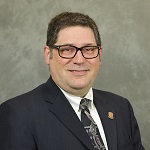Program Director, Integrated Biomedical Sciences
Professor, Cellular and Molecular Biology
Phone: 903.877.7678
Email: pierre.neuenschwander@uttyler.edu
Department: Cellular and Molecular Biology
Popular Searches

Program Director, Integrated Biomedical Sciences
Professor, Cellular and Molecular Biology
Phone: 903.877.7678
Email: pierre.neuenschwander@uttyler.edu
Department: Cellular and Molecular Biology
Dr. Neuenschwander received his BS degree in Chemistry from the Rochester Institute of Technology, NY in 1985, and his doctorate in Biochemistry & Molecular Biology from Stony Brook University, NY in 1990. He then joined the Cardiovascular Biology research group at the Oklahoma Medical Research Foundation as a postdoctoral fellow doing basic biomedical research in the area of thrombosis and hemostasis with a focus on enzymology and protein structure/function studies, becoming an Assistant Member in 1995. In 2001, Dr. Neuenschwander accepted a position here at The University of Texas Health Science Center at Tyler as an Associate Professor of Biochemistry to continue his work. Although his historical focus has been on research, he has maintained a keen interest in instruction and has been involved in educational activities here at the University since his arrival. He was appointed as the Director of the Master of Science in Biotechnology degree program in 2010, and was intimately involved in setting up this inaugural degree program and sheparding the institution through the initial SACSCOC accreditation process from 2012-2015. He formerly served as the University's Senior Associate Provos. Currently, Dr. Neuenschwander serves as Program Director over the PhD in Integrated Biomedical Sciences program, and holds the faculty rank of Professor of Cellular & Molecular Biology.
In additional to his administrative responsibilities, Dr. Neuenschwander maintains his involvement in research and teaching and was awarded the Regent’s Outstanding Teaching Award in 2014. His research has been funded by the NIH/NHLBI as well as the AHA and he is currently involved in AHA-funded research related to the development of hemocompatible surfaces. His other research interests involve studies of the role of coagulation in the pathogenesis and propagation of pulmonary distress in influenza, as well as Molecular Dynamics simulations of various coagulation complexes using the Stampede2 supercomputer at the Texas Advanced Computing Center in Austin.
Education & Training
Oklahoma Medical Research Foundation Postdoctoral Fellowship, Cardiovascular Biology, 1995
Stony Brook University PhD, Biochemistry & Molecular Biology
1990
Rochester Institute of Technology (RIT) B.S., Chemistry, 1985
Courses Taught
BIOT 5131 Critical Reading I BIOT 5221L Proteins & Nucleic Acids Lab BIOT 5312 Molecular
Biochemistry BIOT 5132 Critical Reading II (Team Lecturer, 1 Module) BIOT 6311 Biotechnology
I (Team Lecturer, 1 Module: “DNA Strategies for Protein Expression”) BIOT 6312 Biotechnology
II (Team Lecturer, 2 Modules: “Protein-Protein Interactions-Biacore”; “Microarrays”)
BIOT 6336 Biophysical Chemistry (Team Lecturer, 5 Modules: “UV/vis Spectroscopy”;
“3D Protein Structure Determination-Xray Crystallography and NMR”; “Mass Spectrometry”; “Surface Plasmon Resonance”)
Research Interest
Enzymology and protein structure/function studies of the coagulation system. Generation
and characterization of hemocompatible/thromboresistant biomembrane-mimetic coatings
for artificial surfaces. The role of coagulation in the pathogenesis and propagation
of pulmonary distress in influenza. Molecular Dynamics simulation studies and molecular
modeling of coagulation complexes.
Publication Highlights